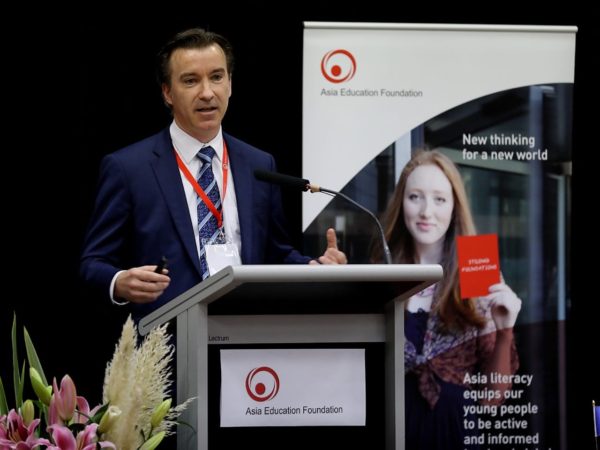
My last post on this site was over 3 and a half years ago. I regret not writing more, or documenting more the thoughts, ideas, and experiences I’ve had in that time. I don’t regret what has happened over that time however. A lot of hosting fees have been wasted over the last few years, but perhaps I can be more consistent and committed and make up for some of that.
This image was taken about one year into the not-so-new role as Executive Director of the Asia Education Foundation. I think I spent the first year suffering from imposter syndrome – it was a surprisingly big step to come in and lead the recovery of an organisation, within a wider body (Asialink) within a big University, and do it through the lens of intercultural learning. However, I found myself never once regretting the move or the work. It actually felt like the challenge I needed. While 2018 was hard and we had some challenges, 2019 was a wonderful series of positive outcomes. I am excited for what 2020 will bring.
Which brings me to the notion of regret. When I spent a year travelling the world in 1997-98, I kept detailed diaries (when that was a thing) and made constant reminders to myself that I wouldn’t regret taking or not taking opportunities to explore. When plans changed, when people changed, when weather changed, when money changed… I dwelled on them sure, but quickly looked for a positive perspective that would help me frame the lesson and the context for next time. I have lived with those lessons intently since then, and they have shaped so much of my work, my networks, and my actions.
I think that people who live with regret, live without consideration of the present. Regret by its nature is something we look into the past wishing we could change. Things we did or didn’t do. If you regret things often enough, it makes you frame your memories in negative ways, and might also make you highly ambivalent or indecisive about future choices and contexts. The biggest regrets involve people. Which is why I think any profession that works closely wth people suffer from more regrets. As we get to know people and as we work with them, choices and contexts emerge that shape our relationships. Regret comes in at crucial decision points, or through cumulative instances and interactions – often seen in retrospect with a different lens. Having some regrets makes us wiser, which is why I remind myself that our actions in the present matter even more. When you’re faced with a decision or situation, ask yourself – what might I regret most?
I believe one of the key signposts for regret is serendipity. When an opportunity or peripheral piece of a puzzle passes by, and you turn them down, ignore them, put it off, play it down, or wait for it to come around again, you build up a bank of moments to regret. It’s not that you should accept everything, it’s that you lose sight of the things that help shape your choices and contexts. Serendipity can be a very powerful antidote to regret, and you can even curate it to work for you – something I wrote about over 7 years ago.
I don’t want to regret not writing more – something I feel when I look back on the posts I used to make. As we get older it might be our curse that we regret more; our experiences diversify. But I’m sure young people would share a whole swag of regrets – and might be an insight into the level of wellness and lack of resilience that plagues so many youth. Perhaps it is the perspective Frank Sinatra sang in My Way – “Regrets, I’ve had a few. But then again too few to mention.” Look for the pattern in your past to affirm the regrets you might have in the present. Turn the few you have into stories that build empathy, connection, and real learning.
